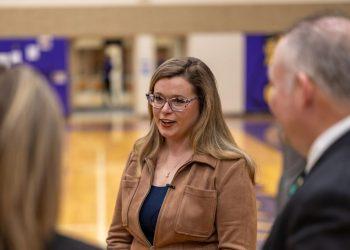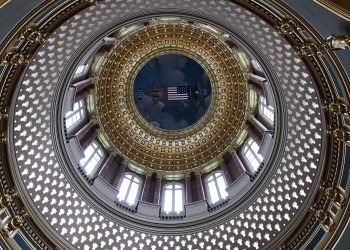(The Center Square) – The Iowa Senate Appropriations Committee advanced on Tuesday a $2.03 billion budget proposal for Fiscal Year 2022 for health and human services.
The bill also presents an “asset test” for public assistance programs.
State Senator Mark Costello, R-Imogene, presented the bill, SSB 1267, which the committee approved by a 12-7 vote.
The asset verification would require information on each applicant that includes earned and unearned income, prison status information as well as supplementary security income information, employment information, and any benefits assistance from other states.
“Our goal with that is to try and make sure that the people who are eligible for these services get them and that people who are not eligible don’t get them and to find that out quickly,” Costello said.
Appropriations include $11.2 million and 27 full-time positions for the Iowa Department on Aging; $1.2 million and 16 full-time positions for the Office of Long-Term Care Ombudsman; $1.2 million and 15 full-time positions for the Iowa Department of Veterans Affairs; and $7.1 million for the Iowa Veterans Home.
The Iowa Department of Human Services would receive $1.5 billion for medical assistance program reimbursement; $89 million for child and family services; $40 million for the family investment program general fund; $31.3 million for field operations; $47.2 million for state child care assistance; $40.8 million for child care assistance; $32 million for child and family services; $15.9 million child support recovery; and $12 million for the job opportunities and basic skills program.
Appropriations to the Iowa Department of Public Health include $23.7 million and 12 full-time positions aimed at reducing and treating addictive disorders and an additional $5.8 million and 14 full-time positions for promoting the health of children, adolescents, and families.
The proposal includes 4,566 full-time equivalent positions with an increase of $36.9 million and 155.7 FTEs compared to Fiscal Year 2021, Costello said.
Changes to the budget also include the appropriation of $1 million for the creation of two centers of excellence programs to “encourage innovation and collaboration” among regional healthcare providers to “transform health care delivery” for the targeted needs of local residents.
One-time funding of $1 million for SafeNetRx would support the expansion of an automated multi-dose prescription packaging system for prescription drug donations to safety net providers and their patients. The company aids in the distribution of properly sealed, unused, unexpired medications to people for free who can use them through specialty clinics, Costello said.
The Fulfilling Iowa’s Need for Dentists project, which is a collaboration with Delta Dental, would receive an additional $200,000 to boost the number of dentists in rural Iowa.
There is also an increase of $381,000 for three new full-time positions for the medical examiner’s office to eliminate a backlog and to expedite autopsies, he said.
“They’ve kind of gotten the backlog down, but they need to hire new examiners to help in the future and to make it so that they’re not doing more than they’re supposed to do and meet federal requirements,” Costello said.
The reimbursement rate for air ambulance services would increase “to the extent possible” with an additional appropriation of $100,000 to “acknowledge that inequity” that the Medicaid rate is “way below” the Medicare rate and “extremely below” what the private insurance pays, Costello said.
The bill also includes appropriations of $424.5 million derived from other funds, which is a decrease of $14.5 million compared to Fiscal Year 2021, Costello said. For example, the sports wagering receipts fund would provide $1.75 million for problem gambling and substance-related disorder prevention and treatment and recovery services.
Costello presented a single amendment to the bill to increase the RSVP program for seniors by $139,700, which also passed.
The bill does not contain the $60 million appropriation for mental health regents, which is included in SF 587, which passed the Senate on April 6.
















